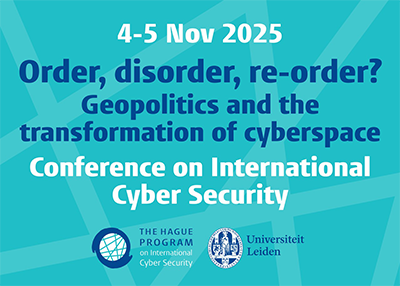
2023 Conference on International Cyber Security: War and Peace. Conflict, Behaviour and Diplomacy in Cyberspace
The Call for Papers is open for our 2023 Conference on International Cyber Security - you have until 21 May 2023 to send in your extended abstract.
The world is increasingly in turmoil: ranging from full blown military conflict, like the war of aggression in Ukraine, to steadily rising tensions between China and the United States at the economic and geopolitical levels. Geopolitical tensions have spilled over into other domains of international politics, with some states choosing sides and others trying to maintain independence and/or siding with larger powers when it is in their interest. Intelligence agencies and diplomats are playing their roles in serving state interests and in preserving, promoting or disturbing international stability. Cyberspace and the digital realm are no different.
The war in Ukraine looks different than many had expected in terms of cyber operations, but cyber and information operations are now integrated in the hostilities at a new level. There is a ‘chip war’ ongoing between the US and China that is also implicating other chip producing countries and the pressure to choose sides is high. Regional blocs – like the EU – are trying to assert strategic autonomy and chart a course for digital sovereignty. Diplomatic efforts are ongoing at the UN level where the Open Ended Working Group tries to move forward on responsible state behaviour in cyberspace and the Ad Hoc Committee is negotiating a global treaty on cybercrime. Meanwhile states continue to conduct ‘peace time’ cyber operations – often the covert work of intelligence agencies – and expand the boundaries of the ‘grey’ zone.
Cyberwar is not much talked about anymore, but not because we live in the age of cyber peace. Quite the contrary. A multipolar and geo-politicised cyberspace, and the governance thereof, is developing through conflict (the role of cyber in war and conflict), state behaviour (push and pushback on state cyber operations) and the work of diplomats in forging rules of the road and creating accountability structures, or failing to do so.
In 2023, we want to discuss cyber war and peace. How are the grand concepts of war and peace shaping and being shaped by digital technologies? What is cyber conflict, and what is conflict with a cyber dimension? How does the under- or unregulated grey zone of cyber operations influence stability, conflict and peace in cyberspace and beyond? How is the very existence of another domain of conflict shaping traditional thinking about grand strategy and military planning? How do the rising geo-economic tensions between digital economies and in global supply chains translate into international relations between states? How are private actors who develop or share such technologies navigating such turbulence? What are the challenges of negotiating diplomatic solutions for cyberspace in a world with a rising political temperature and a declining faith in multilateral solutions for global problems?
This is the second annual academic conference of The Hague Program on International Cyber Security, which continues the proud tradition of the annual conferences of The Hague Program for Cyber Norms. We welcome all papers that have an interesting take on the theme of War and Peace, addressing conflict, state behaviour and diplomacy in cyberspace. As always, we aim to bring together scholars from a diverse range of disciplines including – but not limited to – international relations, international law, economics, political economy, security studies, political sociology, philosophy, political science, science and technology studies and engineering. The key to understanding international cyber security lies in bringing together the various disciplines that relate to the theme in a broad sense. This call for papers is therefore open to extended abstracts from a wide range of academic disciplines. “Human science dissects everything to comprehend it,” wrote Tolstoy in his epic novel whose title reflects our theme. The objective of the conference, however, is to piece together analyses from various disciplines and perspectives, and offer a fuller understanding of the interplay between ‘cyber’, war, and peace.
The annual conferences of the Hague Program on International Cyber Security, and before that The Hague Program for Cyber Norms, has become a key multidisciplinary venue for peer-reviewed research in the study of cyber security and international stability. See our website for the program and impressions of the previous editions of the conference in 2018, 2019, 2020, 2021, and 2022.
We welcome extended abstracts of maximum 800 words on questions related to the theme of War and Peace in a broad sense. We explicitly welcome contributions from early career scholars. The conference will take place in The Hague on 7 and 8 November 2023. Authors of accepted extended abstracts should prepare their final paper by 15 September 2023. A best paper prize will be awarded.
Accepted contributors are eligible for funding for travel and lodging (plus visa costs, if applicable), and do not need to pay a conference registration fee.
How to submit your abstract
Abstracts should be submitted by email to conference@thehagueprogram.nl
Please make sure your abstract submission meets the following requirements*:
- Length: 600-800 words
- Format: .doc only!
- Blind review/anonymous: please leave out your name and other identifying details in the submission document
- Please mention separately in your email: your full name and current affiliation/position
*If your abstract does not follow these requirements, it will not be taken into consideration.
Important dates
- 21 May 2023: Deadline for submission of extended abstracts
- 31 May 2023: Notification of acceptance
- 15 September 2023: Submission of full paper (max. 6000 words, excl. footnotes and literature - for references, please use Chicago Manual of Style (preferred citation format being author-date))
- 16 October 2023: Feedback by review committee
- 7-8 November 2023: Conference



































_400x286.png)


















































_400x286.jpg)



